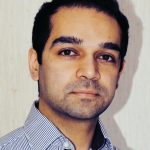 Ahmed Rashid is an academic clinical fellow in general practice at the University of Cambridge. He writes the regular monthly column “Yonder” in the BJGP: a diverse selection of primary care relevant research stories from beyond the mainstream biomedical literature. Twitter: @Dr_A_Rashid
Ahmed Rashid is an academic clinical fellow in general practice at the University of Cambridge. He writes the regular monthly column “Yonder” in the BJGP: a diverse selection of primary care relevant research stories from beyond the mainstream biomedical literature. Twitter: @Dr_A_Rashid
You can download the PDF here at BJGP.org.
Health checks
The NHS Health Check programme has divided opinion ever since it was first launched in 2008. The idea of proactively checking and managing an individual’s vascular risk may seem sensible but the evidence about the effectiveness of this approach has been lacking and has led to much debate in the medical community in recent years. As part of a contract with general practices to deliver this programme in the North West of England, a team of researchers recently surveyed GPs and practice managers across 55 practices.1
Time and software were key barriers to implementation, and payments were considered insufficient to cover the considerable increase in nursing workload that was required. With fewer than half of respondents deeming the programme beneficial to their practice, the paper concludes that practices will need much more support from commissioners if the programme continues to run.
Insomnia
Insomnia is extremely common and the cause of enormous frustration for patients, families, and GPs alike. A recent UK-based study sought to understand more about the causes of this frustration by interviewing both patients and health professionals in primary care settings in Nottinghamshire and Lincolnshire.2 Clinicians focused more on treatments rather than insomnia itself and felt advice about sleep hygiene was often disregarded. GPs often colluded with patients to prescribe hypnotics to avoid confrontation, and cognitive behavioural therapy (CBT) was rarely considered, despite being a recognised management option. Patients, meanwhile, often used hypnotics in ways that were not intended and felt GPs focused too much on the underlying causes of the insomnia rather than the impact of it.
Improving undergraduate and postgraduate medical training, establishing a recognised primary care pathway including pharmacists and local mental health services, and increasing public awareness of non-pharmaceutical treatment options were all suggested as possible strategies by the study authors.
Nursing homes
Nursing home residents are typically extremely frail and often have multimorbidity, polypharmacy, and multiple, complex medical and social needs requiring difficult medical decisions to be made. In Sweden, much like in the UK, GPs are usually responsible for the care of individuals in this setting and a recent study sought to understand what Swedish GPs thought about this aspect of their work.3 They described a discordance between the demands from staff and the actual need of care for the individual patients. However, despite the challenges, working in this setting was considered important and meaningful, with GPs feeling confident in their ability to provide a holistic and balanced approach. A positive and continuous relationship with nursing colleagues was considered one of the key aspects of the job and central to ensuring the wellbeing of residents.
Spirituality
In recent years, spirituality has become an increasingly well-recognised aspect of wellbeing that should be addressed as part of a holistic healthcare approach — particularly, for example, at the end of life. Traditionally, hospital chaplains have been recognised as spiritual carers, although religion is just one of many ways individuals can experience spirituality. In order to assimilate current thinking about the role of the doctor in the discussion of spirituality, an Australian research team conducted a systematic literature review identifying 54 studies comprising 12 327 individuals.4 In the majority of studies, over half of participants thought it was appropriate for the doctor to enquire about spiritual needs. However, preferences were not straightforward and there was a mismatch in perception between patients and doctors about what constitutes this discussion and therefore whether it has actually taken place.
Although patients do not expect their doctor to be a spiritual adviser, they do want holistic care and strong doctor–patient relationships, and the authors suggest therefore that efforts should be made to identify those patients who would welcome such discussions.
REFERENCES
1. Krska J, du Plessis R, Chellaswamy H (May, 2015) Views of practice managers and general practitioners on implementing NHS Health Checks. Prim Health Care Res Dev 20:1–8.
2. Davy Z, Middlemass J, Siriwardena AN (2015) Patients’ and clinicians’ experiences and perceptions of the primary care management of insomnia: qualitative study. Health Expect 18(5):1371–1383.
3. Bolmsjö BB, Strandberg EL, Midlöv P, Brorsson A (2015) ‘It is meaningful; I feel that I can make a difference’ — a qualitative study about GPs’ experiences of work at nursing homes in Sweden. BMC Fam Pract 16:111.
4. Best M, Butow P, Olver I (2015) Do patients want doctors to talk about spirituality? A systematic literature review. Patient Educ Couns 98(11):1320–1328.




